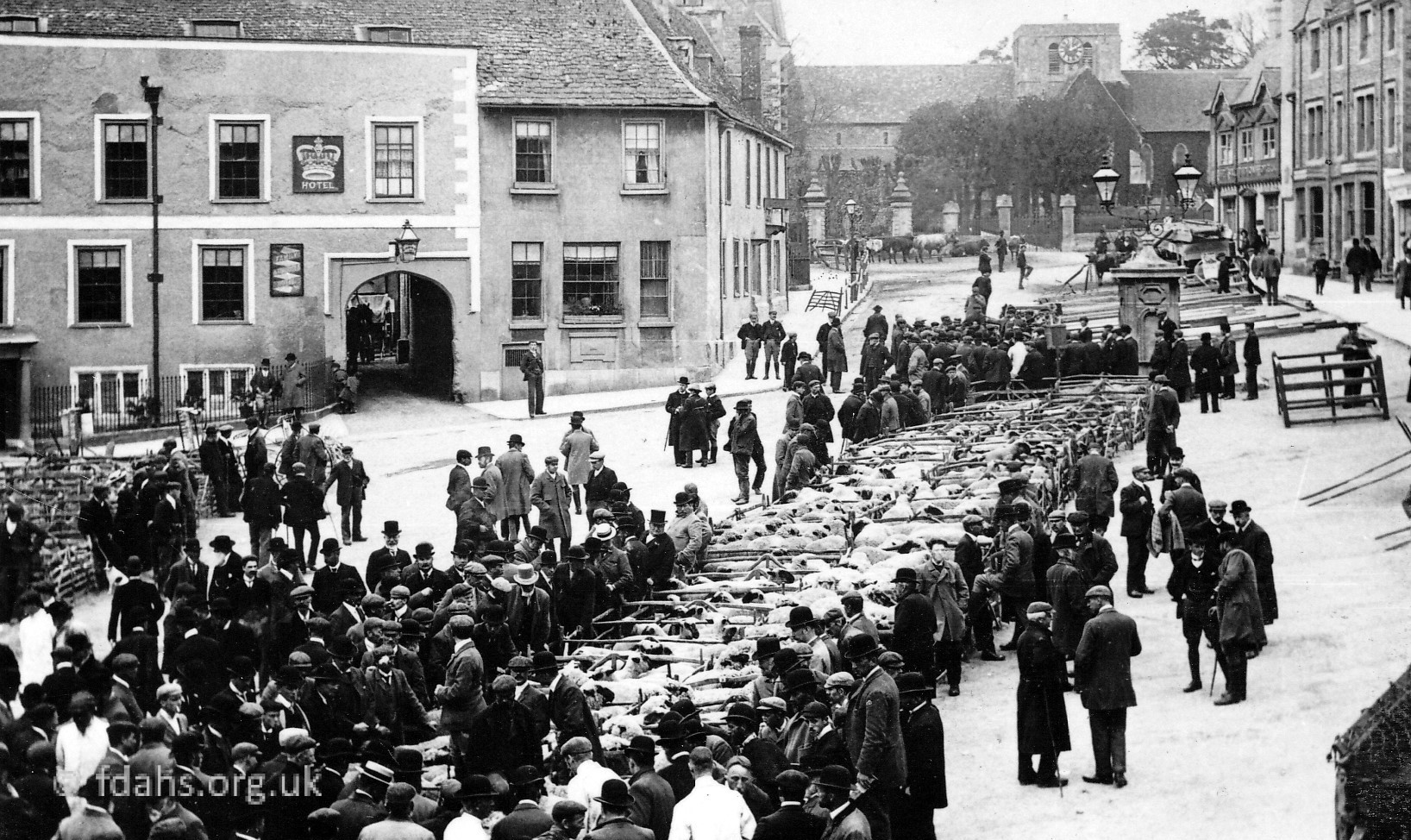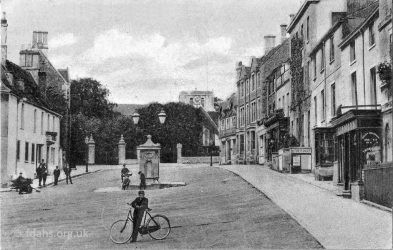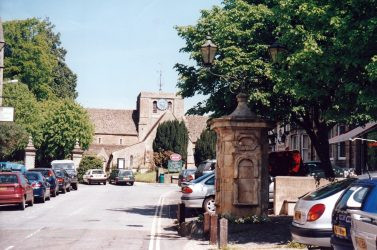The Pump House
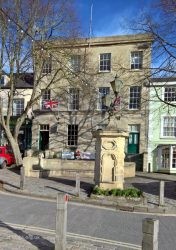 The Pump House is owned by Lord Faringdon (of Buscot House & Estates) and is currently leased to the town.
The Pump House is owned by Lord Faringdon (of Buscot House & Estates) and is currently leased to the town.
The building is first recorded as being Faringdon’s first bank (County of Gloucester Bank). In the 1880’s it then became the offices of the Eagle Brewery. At the start of the First World War in 1914, Lord Faringdon’s grandmother, Lady Violet Henderson, offered the building to the Joint War Committee as an Auxiliary Red Cross Hospital. It outgrew itself within only a few months. More…
The Pump House then remained as a club for ex-servicemen until the lease was taken over by Faringdon Town Council and it became a Community Centre and Community Theatre open to all from 1978-1999.
Refurbished in 2006, it became the home of the Faringdon Town Council offices, the Tourist Information Centre, and the Faringdon Museum. The Jubilee Room on the first floor is available for hire for meetings and other activities.
The Faringdon Museum
 In 2019, Faringdon got its own museum, located in the Pump House. The museum is funded by Faringdon Town Council and Oxfordshire County Council. It provides a permanent display that gives a history of our fascinating town assembled and curated by Faith Carpenter. There is a complete timeline of Faringdon’s history, also cabinets displaying Faringdon fossils, Faringdon’s ancient residents, Faringdon at war and much more. In particular the museum incorporates a collection of fossils provided by the Oxfordshire Geology Trust from the unique Faringdon Sponge Gravels. There is also a presentation of the unique life and works of the eccentric Lord Berners who lived at Faringdon House. Also, a very interesting little snapshot of life in Faringdon during the First World War.
In 2019, Faringdon got its own museum, located in the Pump House. The museum is funded by Faringdon Town Council and Oxfordshire County Council. It provides a permanent display that gives a history of our fascinating town assembled and curated by Faith Carpenter. There is a complete timeline of Faringdon’s history, also cabinets displaying Faringdon fossils, Faringdon’s ancient residents, Faringdon at war and much more. In particular the museum incorporates a collection of fossils provided by the Oxfordshire Geology Trust from the unique Faringdon Sponge Gravels. There is also a presentation of the unique life and works of the eccentric Lord Berners who lived at Faringdon House. Also, a very interesting little snapshot of life in Faringdon during the First World War.
The Community Theatre
 The Community Theatre was built at the back of the Pump House on Swan Lane in 1976. As part of the Community Centre it was used for various local events and Faringdon Dramatic Society produced three plays a year there from 1978-95. The use of the Pump House as a community centre collapsed in 1999 and the theatre became unused and progressively derelict. Lord Faringdon, who owns the building donated £2,000 and a charity organisation called “The Old Pump House Project” raised £19,000 to revamp the building; and renovation work started in April 2013. Access formally only through the Pump House has also been reopened at the back on Swan Lane. The Pump House Project was set up to promote the use of the building for meetings and classes and other forms of recreation and leisure time occupations.
The Community Theatre was built at the back of the Pump House on Swan Lane in 1976. As part of the Community Centre it was used for various local events and Faringdon Dramatic Society produced three plays a year there from 1978-95. The use of the Pump House as a community centre collapsed in 1999 and the theatre became unused and progressively derelict. Lord Faringdon, who owns the building donated £2,000 and a charity organisation called “The Old Pump House Project” raised £19,000 to revamp the building; and renovation work started in April 2013. Access formally only through the Pump House has also been reopened at the back on Swan Lane. The Pump House Project was set up to promote the use of the building for meetings and classes and other forms of recreation and leisure time occupations.
The Portwell
The Port* well or Portwell, immediately outside the front of the Pump House once appeared very central in the Market Place (photos c1900 & c2000). No, it hasn’t been moved! It was given to the town by Sir Henry Unton, Lord of the Manor during the 1590s when he had (the previous version of) Faringdon House built behind the church. Water was pumped from the spring which still rises in the cellar of the Pump House. It was then the town’s only piped water supply.
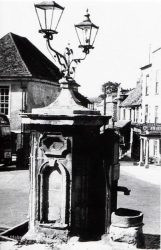 Two gas lamps were placed on top in the 19th century, which were later converted to electricity probably around the 1950/60s when the other street lighting was converted.. On one side there was a hand pump with a heavy lead drinking cup securely chained for people to use. There were also two troughs providing water for the horses and cattle that used the market (photo c1950s).
Two gas lamps were placed on top in the 19th century, which were later converted to electricity probably around the 1950/60s when the other street lighting was converted.. On one side there was a hand pump with a heavy lead drinking cup securely chained for people to use. There were also two troughs providing water for the horses and cattle that used the market (photo c1950s).
* Why is it called the “Portwell”?
Faringdon was once divided by a brook running across the road in (and now buried under) ‘The Narrows’ into the tithings of Westbrook to the west and Port to the east. The term ‘port’ may have originated from that used for the left side of a ship as this is to the left of the brook when viewed from Faringdon House (but that’s pure speculation on my part).
Researched by Ian Lee, August 2019.
